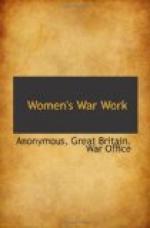In this great struggle the food question assumes greater and greater importance.
The production of food has been affected by the raising of great armies—more than twenty million men are in arms in Europe—by the feeding of armies, for which we must, of necessity, provide food in excess of what these men would need in civil life. The ability to get the food has been made difficult for us by the submarine warfare. Thousands of tons of wheat lie in Australia, but we cannot afford ships to bring it. Tea has been very short in England, though again there are thousands of tons waiting in India. The most urgent need of the Allies is for ships and more ships. There has been great loss of tonnage and the needs of the Army and Navy absorb the service of vast numbers of the available ships. We have moved 13,000,000 men since war broke out, and the supplies and munitions they have needed, to our many fronts. Ceaselessly we move the wounded. We have to bring into Britain half our food. That we have done this, has been due to the British Navy and the Reserves—the patrols and the mine sweepers—the Fringes of the Fleet—and not least, the merchant seaman. About 6,000 merchantmen have been killed by the enemy, some with diabolical cruelty. These men are torpedoed and come into port, and go for another ship at once. On the ship on which I crossed there were seamen who had been torpedoed three times In its submarine warfare the enemy has broken every international and human law—has used “frightfulness” to its fullest extent, and the answer of our merchant seamen is to go to sea again as soon as the ship is ready, and the older men, who had retired, return to sea. The seaman of our country know the enemy. It was our Seamen’s Union that refused to carry the Peace Delegates to Stockholm, and it is they and our fishermen who, in the Reserves, man the patrols and mine sweepers, and who, on our little drifters and trawlers, have fought the enemy’s big destroyers—fought till they went down, refusing to surrender.
It is not strange that the best-liked poster in our Food Crusade, and the one people want everywhere, is a simple drawing of a merchant seaman, and under it the words, “We risk our lives to bring you food. It is up to you not to waste it.”
The countries that can succeed best in solving the food question are the countries that will win, and the food problem will not cease, any more than many others, when peace is declared.
Very early in the war, existing organizations, such as the National Food Reform Association, and newly created ones, the National Food Economy League and the Patriotic Food League of Scotland, did a great deal of active work on food saving. They aimed at instructing in the scientific principles of the economical use of food, and issued admirable leaflets and Handbooks for Housewives and Cookery Books. A series of Exhibitions, often described as “Patriotic Housekeeping Exhibitions” were held in different




